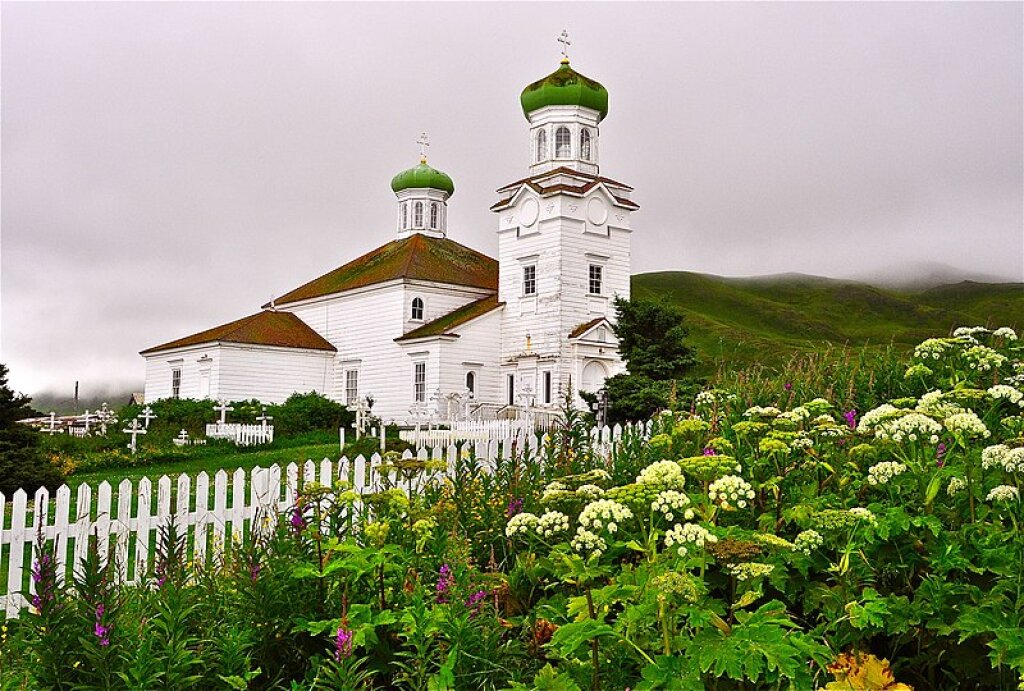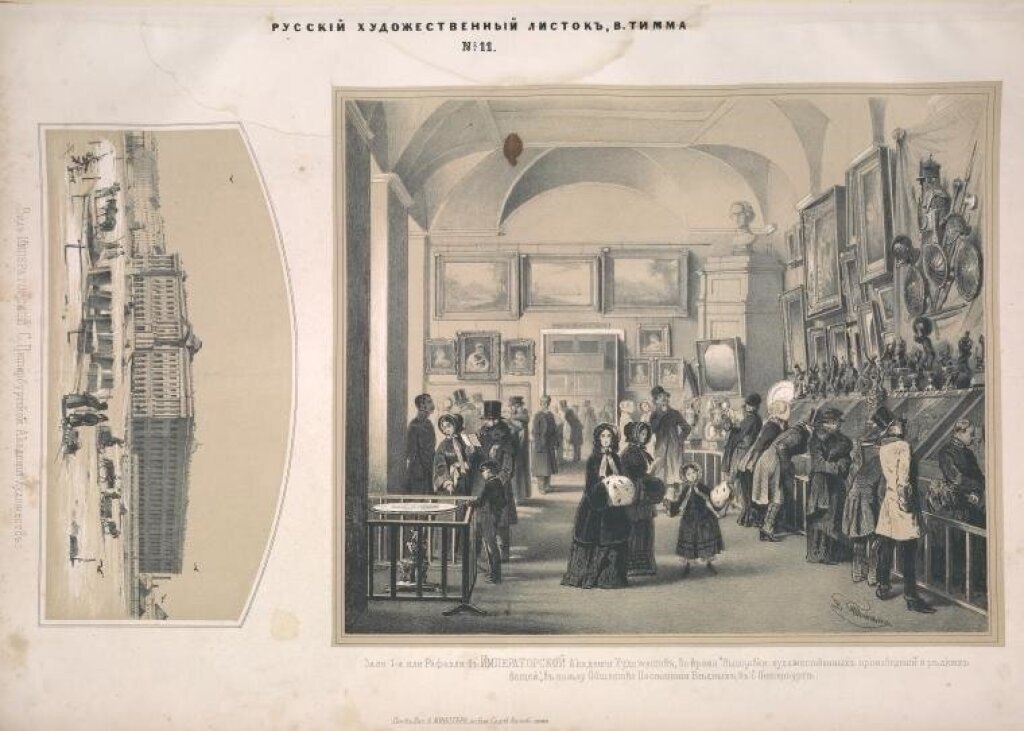The Jordan Center stands with all the people of Ukraine, Russia, and the rest of the world who oppose the Russian invasion of Ukraine. See our statement here.
Last spring the online working group 19v hosted a forum on the question: How will our scholarship on nineteenth-century Russian culture change in response to Russia’s war on Ukraine? Six scholars responded in brief talks, which were then followed by open discussion. Revised versions of the presentations were recently published as short essays in the journal Ab Imperio. The Jordan Center is grateful to Ab Imperio for their permission to post the cluster introduction and the below essay on the Blog this week.
This is Part II in a two-part series. Part I may be found here.
Above: The Church of the Holy Ascension in Unalaska in the Aleutian Islands of Alaska.
Susan Smith-Peter is Professor of History and Director of the History MA and Public History programs at the College of Staten Island/ City University of New York. Her book, Imagining Russian Regions: Subnational Identity and Civil Society in Nineteenth-Century Russia, was published with Brill in 2018.
Two case studies
In order to show scholars that this is an opportunity as well as a challenge, I will speak about the massive archival resources available in the US and elsewhere in two subfields: Russian-American relations and the history of Russian America (now Alaska). I have researched and written in both fields and can speak from direct experience. Other rich subfields would include the emigration and the history of Russia and the USSR in international institutions, which have their own archives outside of Russia.
The history of Russian-American relations is obviously relevant today. There is a well-developed historiography in the topic, but it is seen as a peripheral field within Russian history. As a result, there could be more people who work on it than there are now. Extensive programs of publication of archival materials in Russia dealing with the nineteenth century, led by N.N. Bolkhovitinov, are now especially helpful. Overview works by Norman Saul and others point out the tremendous wealth of archival sources outside of Russia, which have barely been tapped by scholars due to the funding structure, which I will discuss below.
Russian-American relations go beyond diplomatic history, which reigned supreme in history a century or more ago and has been less prestigious for some time now. Even so, diplomatic history has much to say to our moment. There are also the histories of individuals who established connections with Russia and the Soviet Union, as well as immigration/ diaspora studies of the various waves of Russians who came to the US and elsewhere. While this article cannot list all the archives that could support such work, let me assure you from experience that there is enough for several generations of grad students to work on.
The audience for such works would also be especially wide, from members of the general public to the US government. More historians should be able to speak to these audiences with a depth of knowledge that comes from archival work.
The second case study is the history of Russian America, now Alaska. There have been several new works on this history published in the West recently, which is heartening. However, Russian America has tended to be excluded from the study of empire and often is simply not shown on maps of the Russian Empire in recent scholarly works on that subject. In addition, we often read of definitions of the Russian empire as contiguous, not maritime. This erases Russian America again.
The study of Russian America is particularly important because Alaska Natives are a significant audience. The Russian legacy remains important in Alaska in many ways. The Russian Orthodox Church has become an indigenous church in Alaska and provided a means by which Native languages and traditions could survive through decades of English-only policies under the US. Also, because the American legal system is a precedent-based one, the policies of the Russians toward Alaska Natives can still be highly relevant. Alaska Natives were able to reclaim control of their lands through the Alaska Native Claims Settlement Act (ANCSA) in 1971 partly due to arguments based on Russian policies toward the Natives.
During my travels through Alaska, I was struck by the hunger of many Alaska Natives to learn about their family and tribal history, which was stymied by their inability to read Russian. (It should be of interest that the US forcibly closed down schools that taught Russian and Native languages into the twentieth century.) Russian historians could help to connect Alaska Natives to their past as well as make major contributions to the field.
Major collections of Russian-language materials, such as the Alaska Russian Church Archive at the Library of Congress, as well as smaller ones, such as those held by Sealaska Heritage Institute, the cultural arm of the Tlingit tribe in Juneau, Alaska, provide a bounty of primary sources. In addition, a major publication program of Russian American material from the Russian archives, again led by Bolkhovitinov, means that the Russian archives are accessible.
If these subfields, which now are seen as peripheral, could become more central to the field, a great deal of important new work could be done that would benefit the field as well as a variety of communities and provide a new audience for works on Russian history.
The project, not the place, should determine funding
The funding structure for grad students and others in the US is a major obstacle for the transformation I outline above. As it is now, year-long funding is basically only available for archival work in Russia. As a result, in the past, most grad students, quite rationally, decided not to work in archives outside of Russia. If someone wanted to work in those archives, they would have to cobble together a series of shorter fellowships that usually go to Americanists and that might hurt them on the job market. It might be assumed that they had been unable to secure a major grant.
Grad students, over the last few years, have suffered from not being able to go to archives due to COVID and then having their access cut short due to the war. Some students have further suffered due to the inflexibility of grant requirements, which were written for a different time and do not allow for funding unless it includes travel. Such requirements are now archaic and need to be rethought. Funding needs to be more flexible in order to be useful.
Instead of giving funding for travel to archives in Russia, funding should be determined by the project itself. Scholars should be able to propose travel to a variety of places in the US or elsewhere other than Russia. The needs of the project would determine the places where research would be done. This would avoid fetishizing the Russian archives. Travel to Russia is not the main point. Collecting relevant material for a dissertation or other scholarly project is.
Some funding should give researchers time to work on the project without any travel component. There have been major collections of archival material that have been made available as databases, but they have not been as widely used as they could be. Without research funding, scholars, both grad students and professors, have to teach rather than devote time to working through sources. As a result, databases of archival materials alone do not solve the problem.
A major effort to collect copies of Russian archival materials from scholars is now underway, which could preserve access to some materials for scholars. This is being done through ASEEES, which is important, as otherwise grad students would be limited to those materials their advisors had, which presents equity issues. Still, without time-based, rather than place-based, funding, these resources will not allow grad students the year they need to collect and work through sources. Some top universities do provide time-based funding, which gives their students an enormous advantage. Funding institutions who helped provide such funding would be helping to increase equity in our field.
If this change in the funding structure could be implemented, the benefits would be enormous. The field would no longer be held hostage by Russia’s visa policies. Scholars could criticize Russia, if they so choose, without fear of losing their status as serious scholars who do archival work. Russianists would be able to reach new audiences, such as Alaska Natives, and do work that is important to immigrant communities. The vast and rich Russian-language archival resources in the US and elsewhere would start to be used in a systematic way by scholars. Most importantly, the field could start to break away from taking the viewpoint of the Russian state as the default and most prestigious one.
To keep the same structure would mean losing on these opportunities and refusing to chart a course independent of Russian policies and pressures. The public deserves better from us.



